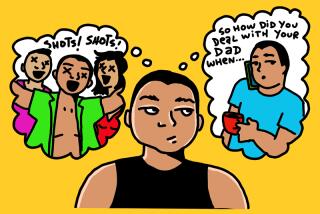Expert on Aging Debunks ‘Myth’ of Children’s Neglect of Parents
The notion that elderly, ailing parents of today are forgotten or neglected by their adult children--unlike the days when mom and dad typically moved into their children’s homes--is a myth, an authority on geriatrics says.
“Children are stretching themselves, doing everything they can to take care of their parents,” said Elaine M. Brody, director of human services at the Philadelphia Geriatric Center. Parents are placed in nursing homes “only as a last resort,” and even then they are not abandoned, she said.
“Having a family is a pretty good insurance policy against going into a nursing home,” said Brody, addressing the American Assn. of Retired Persons recently in Anaheim.
Brody said the issue of care for elderly parents is especially pressing today because the number of senior citizens is growing, thanks to medical advancements and better health care, while the proportionate number of children is declining, due to the falling birth rate.
Only 23% of all older people need help, and of those, 80% to 90% are getting the necessary assistance from their grown children, Brody said. But that does not diminish the need for government aid to the elderly, she added.
While a parent may not need help at 65, as the person continues to grow older, he or she may no longer remain self-sufficient, she explained. Children will most likely step in, helping their parents maintain their own households or, when necessary, moving their mothers and fathers in with them, she said.
However, grown children who care for their parents--often while holding down jobs--need assistance in the form of day care, visiting nurses, household maintenance and other support.
“The adult child cannot do it all and must have government help,” Brody said. That assistance “doesn’t discourage the children. The children will do what they can.”
There are exceptions, Brody added, and the stories of ungrateful and hard-hearted children keep certain myths alive. But while there are cases of neglect and even abuse of the elderly, the same can be said about younger generations’ cases of child neglect and abuse, she said.
Although they are willing to help their parents, the children often suffer economic and emotional strain, she said. Such care is often demanding and unrelenting because elderly parents--who in earlier days died quickly of acute medical problems--now suffer from chronic ailments such as arthritis, Alzheimer’s disease and heart problems, she said.
Further, children should be prepared to deal with the same parent-child tensions that cropped up when the parents were heading the household, Brody said.
“Let’s not be foolishly romantic,” she said. “When people turn 65, they don’t suddenly become sweet little old ladies and charming old men.” If they are sweet and charming as senior citizens, it is a good bet they had the same personality when they were younger, she said.
Many of the children caring for elderly parents are in fact senior citizens themselves, Brody said. One-tenth of all people over 65 have children who also are over 65, she said.
But such statistics, turned upside down, reveal a wonderful picture for the younger generations, Brody said.
“At every age, beginning with birth, people now have more older relatives,” she said. It is not unusual for a child today to have great-grandparents, she said, adding, “that never happened in the good old days.”
There are other myths about caring for older parents, she said. First, most elderly parents do not want to move into their children’s homes.
“They want the privacy and dignity of their own homes,” Brody said.
More to Read
Sign up for Essential California
The most important California stories and recommendations in your inbox every morning.
You may occasionally receive promotional content from the Los Angeles Times.










